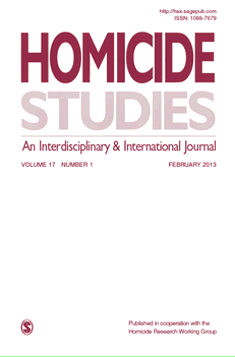
Homicide Studies
Scope & Guideline
Illuminating the Intersections of Law and Psychology
Introduction
Aims and Scopes
- Multidisciplinary Research on Homicide:
The journal emphasizes the integration of various disciplinary perspectives to analyze homicide, including criminology, sociology, psychology, and public health, fostering a comprehensive understanding of homicide phenomena. - Focus on Vulnerable Populations:
There is a consistent emphasis on the study of marginalized and vulnerable groups, particularly in the context of intimate partner violence, racial disparities, and the impact of social structures on homicide rates. - Prevention and Intervention Strategies:
Research published in Homicide Studies often explores effective strategies for preventing homicide, including community-based interventions and policy implications, aiming to bridge the gap between research and practical application. - Exploration of Societal and Cultural Influences:
The journal frequently addresses the societal and cultural dynamics that contribute to homicide, including discussions on gender, race, and socioeconomic factors, making unique contributions to understanding the contextual influences on violence. - Methodological Innovations:
Homicide Studies encourages the use of diverse methodologies, including qualitative, quantitative, and mixed-method approaches, to enhance the rigor and depth of research findings in the field of homicide.
Trending and Emerging
- Impact of COVID-19 on Homicide:
There is a growing focus on how the COVID-19 pandemic has influenced homicide rates and the dynamics of violence, reflecting the immediate societal changes and challenges posed by the pandemic. - Intersectionality in Homicide Research:
Emerging studies emphasize the intersectionality of race, gender, and socioeconomic status, exploring how these factors contribute to disparities in homicide victimization and perpetration. - Community-based Violence Prevention:
Research is increasingly examining community-led initiatives and interventions aimed at reducing violence, highlighting the importance of local perspectives and engagement in addressing homicide. - Mental Health and Homicide:
There is an uptick in studies exploring the relationship between mental health issues and homicide, reflecting a growing recognition of the complexities surrounding mental health in violent behaviors. - Technological and Methodological Advances:
The integration of advanced technologies and methodologies, such as data analytics and behavioral profiling, is becoming more prevalent, enabling deeper insights into homicide patterns and offender behavior.
Declining or Waning
- Traditional Theories of Homicide:
There appears to be a decline in the focus on classical theories of homicide, such as the purely biological or psychological explanations, as the journal gravitates towards more nuanced and interdisciplinary approaches. - General Homicide Statistics:
Research that solely presents statistical data on homicide rates without deeper analysis or context has become less frequent, indicating a shift towards studies that offer more comprehensive insights into the underlying factors and implications. - Historical Homicide Patterns:
Papers dedicated to the historical analysis of homicide trends are less common, suggesting that contemporary issues and immediate social contexts are receiving more attention than retrospective studies. - Non-violent Crime Comparisons:
There has been a noticeable reduction in studies that compare homicide to other forms of violent or non-violent crime, as the journal increasingly focuses on the unique aspects of homicide itself. - Generic Policy Discussions:
Research centered on broad policy discussions without specific recommendations or empirical evidence is declining, signaling a preference for studies that provide actionable insights based on rigorous research.
Similar Journals
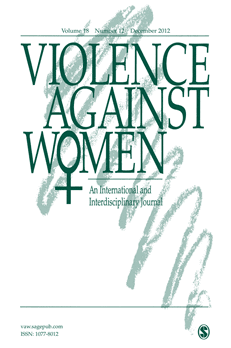
VIOLENCE AGAINST WOMEN
Unpacking the layers of gender-based violence through research.Violence Against Women is a leading peer-reviewed journal dedicated to the exploration and analysis of issues related to gender-based violence. Published by SAGE Publications Inc, this esteemed journal has established itself as a crucial resource in the fields of Gender Studies, Law, and Sociology and Political Science, earning a prestigious Q1 ranking in these categories for 2023. With its comprehensive scope covering both theoretical and empirical research, Violence Against Women aims to inform, educate, and motivate action among researchers, practitioners, and policymakers addressing this critical social issue. The journal's rigorous scholarly contributions foster dialogue and knowledge sharing, underscoring the importance of understanding the complexities of violence against women across various cultural and legal contexts. Researchers can access a wealth of literature that spans two decades, as the journal converges from 1995 to 2024. By disseminating high-impact research, Violence Against Women remains a pivotal platform for advancing further understanding and ultimately contributing to the eradication of gender-based violence.
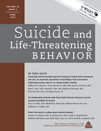
SUICIDE AND LIFE-THREATENING BEHAVIOR
Empowering research for a healthier tomorrow.Suicide and Life-Threatening Behavior is a premier journal published by Wiley, dedicated to advancing the understanding of issues related to suicide and self-harming behaviors. With an ISSN of 0363-0234 and E-ISSN 1943-278X, this journal has been a significant publication in the fields of Clinical Psychology, Medicine, Psychiatry, and Public Health since its inception in 1971. Renowned for its rigorous peer-reviewed articles, it holds a commendable Q2 ranking across multiple categories, reflecting its impact and relevance in the academic landscape. The journal is particularly noted for its comprehensive insights into the epidemiology, prevention, and treatment of suicidal behavior, making it an invaluable resource for researchers, clinicians, and policymakers alike. Access to published works, while not open-access, contributes to a broader discourse on life-threatening behavior and mental health, providing essential knowledge that informs interventions and policy initiatives. With a focus on empirical research and applied practice, Suicide and Life-Threatening Behavior aims to foster understanding and inform future research that can ultimately save lives.

Journal of Criminological Research Policy and Practice
Shaping the Future of Criminological Policy and PracticeJournal of Criminological Research Policy and Practice is a pioneering platform dedicated to the exploration and dissemination of knowledge in the interdisciplinary field of criminology. Published by Emerald Group Publishing Ltd, this journal features high-quality research that addresses contemporary issues and innovative practices in areas such as law, public administration, and social psychology. With an ISSN of 2056-3841 and an E-ISSN of 2056-385X, the journal has garnered a notable presence in the academic community, showcasing a Q3 ranking in Law and Sociology & Political Science as of 2023. The journal provides valuable insights for researchers and practitioners alike, advancing the discourse on criminological policy and its implications for society. It serves as an essential resource for those invested in enhancing social justice, informing policy-making, and understanding the complexities of crime within a broader social context. Encompassing research from 2015 to the present and extending into 2024, the journal stands as a critical reference point for future studies and professional practice in criminology.
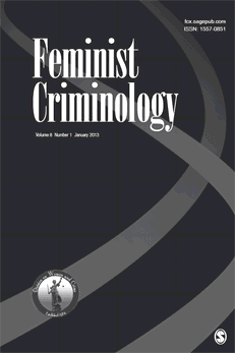
Feminist Criminology
Exploring Gendered Dimensions of Crime.Feminist Criminology is a pioneering academic journal published by SAGE Publications Inc. that focuses on the intersection of feminist theory and criminal justice. With an ISSN of 1557-0851 and an E-ISSN of 1557-086X, this UK-based journal serves as a vital platform for scholars and practitioners dedicated to exploring gendered experiences within the realm of crime and justice. Recognized for its significant contribution to the field, it boasts a remarkable Q1 ranking in both Gender Studies and Law categories for 2023, indicating its prestigious status amongst top-tier journals. The journal is indexed in Scopus, where it holds an impressive ranking, placing it in the 94th percentile for Social Sciences Law and the 90th percentile for Social Sciences Gender Studies. Open access options are currently unavailable, enhancing the journal's exclusivity for its academic audience. With a focus on innovative research from 2006 to 2024, Feminist Criminology aspires to challenge conventional understandings of crime through critical feminist perspectives, making it an essential resource for those engaged in gender studies, criminology, and law.

Global Social Welfare
Empowering voices for a more equitable world.Global Social Welfare is a distinguished academic journal published by SPRINGER INT PUBL AG, focused on advancing scholarly discourse in the fields of sociology and political science. With an impact factor that places it in the prestigious Q2 category for 2023, this journal offers a platform for researchers, professionals, and students to disseminate critical analyses and foster discussions around global social welfare issues. Operating from its Swiss headquarters at Gewerbestrasse 11, Cham CH-6330, Switzerland, the journal provides valuable insights into the socio-political dynamics influencing social welfare systems worldwide, aiming to bridge gaps in knowledge and practice. Although it is not an open access journal, it maintains rigorous peer-review standards, ensuring the publication of high-quality, impactful research. Global Social Welfare is particularly essential for those committed to promoting social justice and improving welfare policies on a global scale, making it a crucial resource for anyone invested in these vital disciplines.

JOURNAL OF QUANTITATIVE CRIMINOLOGY
Bridging Disciplines for a Deeper Understanding of CrimeJOURNAL OF QUANTITATIVE CRIMINOLOGY, published by Springer/Plenum Publishers, serves as a premier outlet for cutting-edge research in the fields of law and forensic medicine. With an impressive impact factor and ranked in the top quartile (Q1) of both Law and Pathology and Forensic Medicine categories in 2023, this journal excels in providing empirical analyses and quantitative assessments that address critical issues in criminological research. Since its inception in 1985, the journal has maintained a reputation for excellence, evidenced by its high standing in Scopus rankings—21st out of 1025 in Social Sciences (Law) and 23rd out of 208 in Medicine (Pathology and Forensic Medicine). Although currently not an open access publication, it offers several subscription-based access options to reach a wide array of academics and professionals dedicated to the advancement of criminological and forensic inquiries. Researchers, professionals, and students will find the JOURNAL OF QUANTITATIVE CRIMINOLOGY an invaluable resource, as it fosters interdisciplinary collaboration and methodological rigor in understanding crime and criminal behavior.
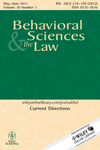
BEHAVIORAL SCIENCES & THE LAW
Unraveling the Complex Ties Between Behavior and LawBehavioral Sciences & The Law is a premier interdisciplinary journal published by Wiley, dedicated to exploring the intricate relationships between behavioral sciences and legal systems. Established in 1983 and continuing through 2024, this journal provides a vital platform for researchers, professionals, and students in the fields of law, clinical psychology, medicine, and psychiatry. With an impressive impact factor reflected in its Q1 ranking in Law and Q3 in Clinical Psychology, Psychiatry, and Medicine, it stands out in the academic community, facilitating scholarly discourse and advancing understanding in these critical areas. While currently not following an open access model, the journal’s reach is extensive, delivering cutting-edge research and thought leadership from the United Kingdom to a global audience. Whether you are investigating the psychological dimensions of legal practice or the implications of law on behavioral health, Behavioral Sciences & The Law remains an essential resource for those committed to the intersection of these disciplines.

Journal of Experimental Criminology
Elevating Experimental Approaches to Crime AnalysisThe Journal of Experimental Criminology, published by Springer, stands as a beacon of innovation within the realm of criminology and legal studies. With an ISSN of 1573-3750 and E-ISSN 1572-8315, this esteemed journal, based in the Netherlands, explores groundbreaking research and experimental approaches to understanding criminal behavior and justice systems. It proudly resides in the elite Q1 quartile of the law category for 2023, ranking an impressive #37 out of 1025 in Scopus within the Social Sciences _ Law domains, placing it in the 96th percentile among its peers. The journal's objectives are aimed at disseminating high-quality empirical research that informs policy and practice, making it an essential resource for scholars, practitioners, and students who strive to enhance the efficacy of crime prevention and criminal justice interventions. With coverage spanning from 2005 to 2024, the Journal of Experimental Criminology invites contributors from diverse backgrounds to engage in the interdisciplinary dialogue that shapes the future of criminological research.

Revija za Kriminalistiko in Kriminologijo
Connecting Scholars to the Heart of Forensic InquiryRevija za Kriminalistiko in Kriminologijo is a prominent academic journal dedicated to the fields of criminalistics, criminology, law, and forensic medicine, published by the Ministry of Interior Republic Slovenia. With its inception in 1981, the journal has served as a pivotal platform for disseminating research findings and innovative ideas relevant to crime and justice issues, particularly in the context of Slovenia and the wider region. Despite its current Q4 ranking in various categories, including Law and Pathology & Forensic Medicine, Revija za Kriminalistiko in Kriminologijo remains essential for emerging scholars and professionals seeking to contribute to the discourse in forensic science and social psychology. Although the journal does not offer open access options, it continues to publish rigorous peer-reviewed articles that significantly impact the field, making it a valuable resource for researchers, practitioners, and students alike. Scholars can access the research at the journal's address in Ljubljana, Slovenia, thereby fostering interdisciplinary collaboration and knowledge sharing.
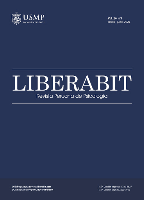
Liberabit-Revista de Psicologia
Transforming Psychological Research into Global KnowledgeLiberabit-Revista de Psicologia is a prominent academic journal dedicated to the dynamic field of psychology, published by the esteemed Universidad San Martín de Porres, within its Faculty of Communication, Tourism, and Psychology. Having embraced an Open Access model since 1995, this journal aims to enhance the global dissemination of psychological research, making high-quality academic work easily accessible to researchers, practitioners, and students alike. Although the journal’s H-index and specific ranking data are currently unavailable, its commitment to fostering scholarly dialogue and innovation in the field underscores its significance. With a robust focus on current psychological theories, empirical studies, and interdisciplinary approaches, Liberabit serves as an invaluable resource for those looking to deepen their understanding of human behavior and mental processes. Its publication from Lima, Peru, adds a unique perspective to the global psychology landscape, inviting contributions that reflect a broad spectrum of cultural contexts.